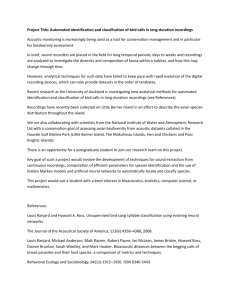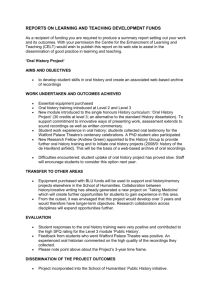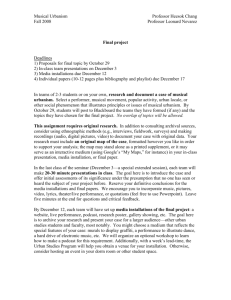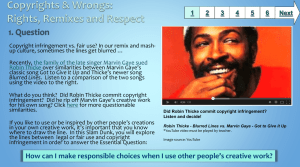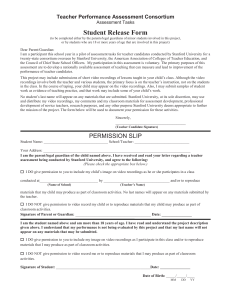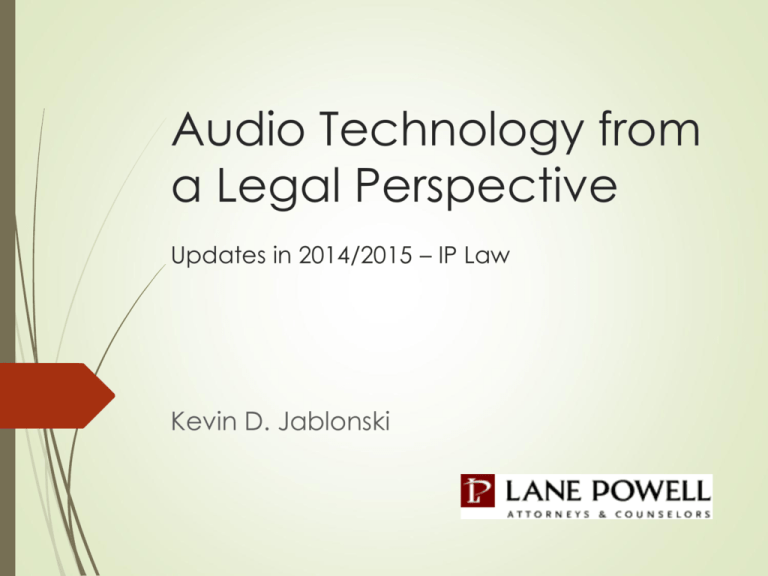
Audio Technology from
a Legal Perspective
Updates in 2014/2015 – IP Law
Kevin D. Jablonski
Overview of Discussion
Topics
Proposed legislation regarding music licensing recently
embraced by the US Copyright Office
Alice Corp. v. CLS Bank – Is software still patentable?
Marvin Gaye or Robin Thicke/Pharrell Williams/T.I. – the
Blurred Lines of copyright infringement.
Additional mind-numbingly boring cases before the
Supreme Court
Overview of Intellectual
Property
Patent
Copyright
Trademark
Trade Secret
Publicity
Rights Conveyed by
Copyright
The right to reproduce the work
The right to prepare derivative works based on the
original
The right to distribute copies to the public
The right to perform the work publicly
The right to display the work publicly.
The right to digitally stream a work.
Copyright and the Music
Marketplace
On February 5 2015, US Copyright Office
“embraces” proposed legislative rules
changes.
Regulate Musical works and Sound
Recordings in a Consistent Manner
Extend Public Performance Rights in Sound
Recordings to Terrestrial Radio
Federalize pre-1972 Sound Recordings
Establish Government enforced Fair-Market
rate setting.
Regulation of Musical Works
vs. Sound Recordings
Sound Recordings are distinguished from
underlying musical works in terms of rights
reserved by a creator
17 USC 112 exempts terrestrial radio from paying
royalties on performances of sound recordings
but not underlying musical works
17 USC 114 makes licensing of a digital
performance of a sound recording mandatory
but not the underlying musical work
Terrestrial Radio and PRO
Currently, sound recordings are exempt from requiring
a public performance license on terrestrial radio
But, internet radio stations, satellite radio, and
generally anything else (other than AM and FM) does
require a public performance license from a PRO
Proposal would eliminate the terrestrial radio
exemption
Federalize Pre-1972 Sound
Recordings
Currently, record labels and artists (sound
recording owners) are not paid for digital
performances of the sound recordings that are
prior to 1972
Proposed legislation would fold pre-1972 sound
recordings into Sound Exchange (or whatever
new government-controlled “free-market” entity
is established).
Rate Setting
Currently, mechanical rights are set to 9.1 cents
per copy (per CD or download)
Department of Justice oversees royalty rates at
PROs (ASCAP and BMI)
Proposal would enable Copyright Royalty Board
and set market rates for public performances
Proposal would offer bundled rights that include
synchronization rights
Proposal would also provide for opt-out rights
Fair Play Fair Pay Act of 2015
Jerrold Nadler, John Conyers, Jr., John Deutch
and Marsha Blackburn introduced this legislation
in the House on April 13, 2015.
Addresses the terrestrial radio issue and the pre1972 issue
Has been tried before.
Songwriter Equity Act of 2015
Introduced to the House by Hakeem Jeffries and Doug
Collins on March 4, 2015
Addresses the Rate Setting issues
Alice Vs. CLS
Decided by The Supreme Court on June 19, 2014
by unanimous decision
The issue – Is a computer-implemented,
electronic escrow service for facilitating financial
transactions simply an “abstract idea” ineligible
for patent protection?
Established a two-part “Alice” test as to whether
claims are eligible subject matter for patents
The Alice effect
USPTO is now rejecting claims having any manner of
software
Courts have been invalidating existing patents at a
four to one rate when any manner of software is
involved
Likely to have crippling effect on economies reliant
upon software innovation
Patent Bar pushing back and USPTO and Courts are
running amok
Blurred Lines of Copyright
Infringement
Marvin Gaye is famous
Robin Thicke/Pharrell Williams/T.I. are less famous but
want to be more famous
When young less-than-famous artists want to become
more famous, artist do well to emulate famous artists
E.g., who are your influences?
Historical Perspective of
Copyright Infringement by
Substantial Similarity
Bright Tunes Music v. Harrisongs Music – aka George
Harrison and The Chiffons
The Chiffons recorded “He’s So fine” in 1962
George Harrison recorded “My Sweet Lord” in 1970
Case established the “substantial similarity” test
George Harrison ordered to surrender a majority of
royalties for his song
The Chiffons later covered “My Sweet Lord”
George Harrison later purchased “He’s So Fine”
HORRIBLE JURY DECISION
Jury awarded 7.4 million dollars to the estate of Marvin
Gaye on March 10, 2015
Jury based in decision on the sheet music – was
barred from actually hearing Marvin Gaye’s recording
of Got to Give it Up
Thicke et al. plan to appeal
Interesting Case:
Garcia V. Google
Cindy Lee Garcia appeared for five seconds in the 12minute You Tube video “The Innocence of Muslims”
Sued You Tube (Google) for copyright infringement
claiming that she did not perform as a work for hire
because she was tricked
Ninth Circuit agreed with Garcia and held that she
has copyright in her performance
Now before the Ninth Circuit en banc (all the judges)
Copyright Office denied the registration and also
stated “[her claim] runs contrary to basic tenets of
copyright and First Amendment law”
Interesting Case:
American Broadcasting v. Aereo
Aereo is (was) a company that records broadcast
television and provides time-shifted viewings to paying
customers or customers who are subject to
advertisements (as directed by Aereo) while watching
Supreme Court held (6-3 decision) that the
transmission of the recorded show is a public
performance and is not licensed
Justices Scalia, Thomas and Alito dissented “The Court
manages to [conclude public performance]only by
disregarding widely accepted rules for serviceprovider liability and adopting in their place an
improvised standard (“looks-like-cable-TV”) that will
sow confusion for years to come.

